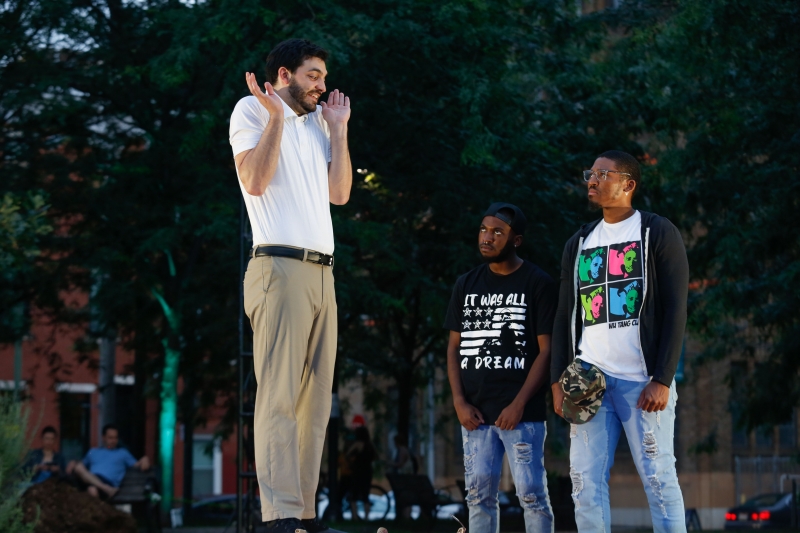Interview: Ozzie Jones, Jared Chichester, Davon Johnson, And David Pica of PASS OVER at Theatre Exile And Theatre In The X
An interview with the director and cast of Theatre Exile and Theatre in the X’s production of Antoinette Nwandu’s Pass Over.

Written by award-winning playwright Antoinette Nwandu, Pass Over is a provocative riff of Waiting for Godot and the biblical Exodus story - a timely take told by a bold American voice.
Pass Over tells the story of two Black men, Moses (Jared Chichester) and Kitch (Davon Johnson) - friends hanging out on a city street corner, sharing dreams of an escape from their circumstances. When a stranger (David Pica) wanders onto their corner with his own agenda, he derails their plans of finding their promised land.
When I had the chance to interview this incredible cast and their esteemed director, Ozzie Jones, I knew it was an opportunity I couldn't pass up.
Pass Over is a co-production between Theatre Exile and Theatre in the X, presented as an outdoor, socially distanced performance at Hawthorne Park in Philadelphia.
"I think that the show being outside in Philadelphia, especially in South Philly after the big protest over the Christopher Columbus statue and how that was by the police, adds a lot of significance to the show," Pass Over performer Davon Johnson says. "The constant sounds of sirens and a real environment that these characters might actually be in makes it easy to draw inspiration."
Actor David Pica explains this exceptionally unique audience viewing experience. "We're not sitting in a dark theatre, watching the actors put a show on for us here. You'll be wearing headphones, sitting in a folding chair, or leaning forward on your blanket, and the words will reach your ears, the acting will happen in front of you, and others will be around you, doing the very same thing."
Director Ozzie Jones gives a reminder to the audience when they listen in. "Make sure you put the headphones on during the pre-show. The music played before the show begins is a big part of the vibe and aesthetic framework of the show. "
Sound and language are a huge emphasis in the show. Nwandu purposely crafted language that some deem "profane" into poetic and humorous conversation, exposing the enduring spirit of two young men seeking a way out of a never-ending cycle. "The play viciously mocks the notion that simply changing language, not saying certain words, are filling one's rhetoric with platitudes will have any impact, at all, on the ocean of blood being spilled in the Black community. This is an essential conversation for the American theater to have." Director Jones says.
So how does a biblical tale relate to the modern struggle of black men in America? Why the title Pass Over? "The title places the struggle of Black men in America against the invisible cage of racism and the violence of its military arm, the police, in the Biblical context of the Old testament fight for freedom of the chosen people enslaved in Egypt," Jones states. "The title makes it clear that the killing and terrorizing of Black men by police is larger than this moment in time. Such State-sanctioned violence and terror has past, present, and future ramifications, not only for a Nation of Black people, but for the Nation itself. There has been, is, and will always be a reckoning for a land committed to such depravity."
Pica, playing the stranger Ossifer/Mister, explains the title has many meanings. "It's Death. It's a threat, a ritual of Faith, a Covenant, a Promise, a final Plague. It's an ending and a beginning. It's Hope, possibly. A tomorrow beyond the dark and violent night. Is it Life? Is it Freedom?"

Jared Chichester (Moses) and Davon Johnson (Kitch)
"The most challenging part of this process to me was finding the right balance of truth within my character." Johnson says about the rehearsal process. "In this show, there are so many layers of subject matter, and everything is so deep that it's easy to be in your head and try to get 'cute' with the acting. The most rewarding part of the process was finding the depth within the script because I think, at first, the script can be mistaken as simple and straightforward."
Johnson says, "I hope that the audience will begin to have a deeper conversation with themselves and that the way the show is presented to them causes them to face things on a more in-depth level than they may have been."
Director Jones states, "I would like the audience to take away a more sophisticated understanding of the race discussion than good words and bad words. The gross silliness of empathy performance."
Performer Chichester explains that this piece is important to produce now. "This piece is relevant because it's still necessary to tell people that my life matters, as if that wasn't a fact in the first place. It's relevant because no matter how many protests are organized, no matter how many speeches are given, and no matter how many trials there are, I, and people that look like me, are still in danger every time we leave the house... I think that this play is important because it both calls out the racism that is ever present, but also calls out the people who think they're not a part of the problem. It makes everyone take a step back and look at the bigger picture by mocking everyone. Literally."
Though the play deals with some heavy subject matter, Pass Over director Ozzie Jones explains that the play has its lighter moments as well. "The play is super funny. I directed it as such." Jones says. "The play highlights the absurdity of America's race and police 'relationship.' So it is ok to laugh."
Chichester explains, "Does this play have moments of intensity, sadness, and anger? Absolutely! Does it also have some of the funniest jokes that I've seen/heard in a long time? Absolutely! Come with an open mind and open heart. You'll appreciate this thing so much more."
"Power, privilege, dreaming, brotherhood, projection, presumption, prejudice, camaraderie, racial inequality, violence, abuses of power, wishing, breaking, identity, agency. If a person claims to understand any one of these concepts/ideas, come have that challenged." Pica says.
Pica continues, "May we offer a completely unique experience that you aren't soon to forget. And when the play finishes, honestly ask yourself: what part of the play is out of place? And then ask what you're going to do? Dare you not to lie."

and Davon Johnson (Kitch)
Pass Over is playing now through June 27th at Hawthorne park. Catch this show before it makes its Broadway debut in fall 2021.
For more information about Pass Over please visit www.theatreexile.org
Content Warning: Pass Over contains frequent and extreme profanity, loud gunshots, and flashing lights, and is intended for mature audiences.
Comments

Videos
